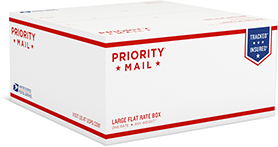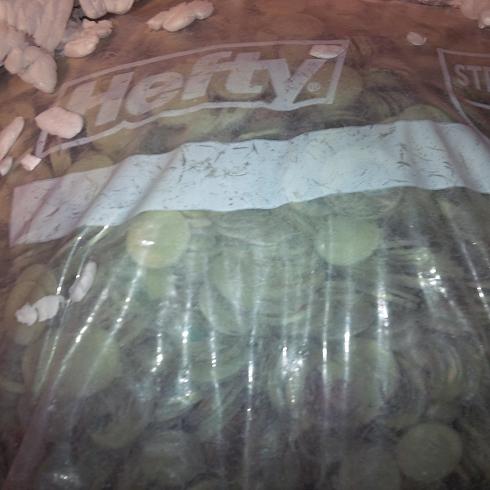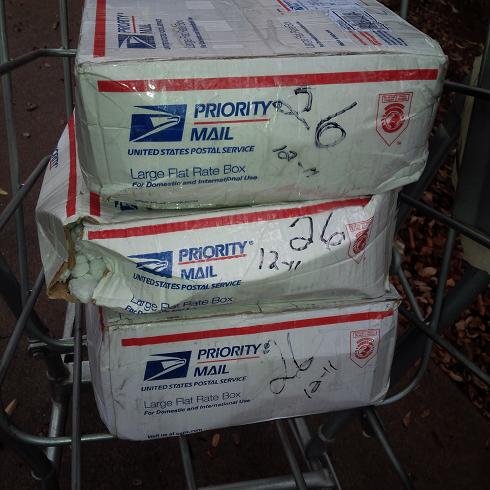|
We are happy to make shipping arrangements for you if you wish.
How to ship your coins is entirely up to you of course, but consider points below depending on the size of your shipment.
In both cases, if you're asked what's being shipped, "metal blanks"
(discs) is probably the most accurate answer.
Some shipping companies (USPS, UPS, etc.) might restrict or prohibit shipping coins.
But, to be considered a "coin", the object must be a "transferable instrument" meaning you can give it to somebody and it be accepted in exchange for a purchase.
The fact that banks won't accept dirty coins means they are not transferable, and therefore not a monetary instrument or "coin" per se.
 More info on shipping coins. More info on shipping coins.
| Small |
Large |
For smaller shipments of a few pounds to 100-200 pounds:
- Go to the Post Office, and pick up your first batch of free flat-rate priority mail boxes. It's better to get the first ones in-person because if you try to order them online, they might take a long time to arrive.
|
|

|
- Choose a box size that's appropriate for the size of your shipment. USPS offers small, medium, and large.
|
|
|
- Double-box. Assemble 2 boxes and stuff one inside the other to give it more strength. Tape the seams and edges of the outer box that you can using good, heavy-duty packing or fiber-reinforced tape. It's easier to tape them before their full of coins.
|
|
|
- If the coins are wet, place them in zip loc bags. A Hefty jumbo-sized strong-seal bag fits perfectly into a large fixed-rate USPS box. Even if coins aren't wet, plastic bags help assure coins don't spill out of a box edge or seam ruptures. The picture (right) is an example of cavern coins we received in bags.
|
|

Click for larger view
|
- Pack each (doubled) box with up to 70lbs of coins. Fill any empty space so the coins canít move around and jingle. Coin movement contributes to box damage. And coin jingling is suspicious / tempting.
|
|
|
- Tape remaining box seams. Donít expect glue that comes on the box to hold back the heavy weight of your coins. Weíve seen the box flaps open on their own even with empty boxes. If the box bursts open, coins will spill everywhere making quite a mess and who knows what will happen to all those dirty pennies strewn about. Notice in the picture (right) the untaped corner of a partially full box broke open.
|
|

Click for larger view
|
|
|
|
|
- Make use of the free USPS tracking. Be sure to get a tracking number.
|
|
|
- Priority mail might come with some insurance included. But we recommend insuring each box in your shipment for between $100 - $400. Assuming your coins are mostly pennies which is most often the case for wishing wells, etc., a penny weighs 2.500g, or only ~0.0055lb. So, 70lb would be 12,700 pennies with a face value of $127. If your coins contain a lot of nickels, dimes, quarters, etc., you might want to bump up the insurance to match their value. On average, we find that a large fixed rate box of pond coins banks for around $350.
|
|
|
|
|
|
|
- Send us the tracking number.
|
|
|
|
|
|
|
We hope this helps!
|
Thousands of pounds of coins to any quantity:
- Prepare. Purchase or scrounge up either
canvas coin bags available from several suppliers, or
5 gallon buckets with lids.
Although they're heavier, most customers prefer buckets since they're commonly available at local hardware stores.
- Pack. Dump the dirty coins into the buckets or bags.
Especially for buckets, top-off empty space with filler material like crumpled up newspaper or bubblewrap.
Seal the container. Bags have drawstrings; just pull and tie them. Buckets must have lids. Place a lid on each buckets pushing down to make sure they're seated all way around.
Further secure bucket lids with
duct tape.
The last thing you want is for a bucket to tip over during transit, the lid fly off, and coins scatter all around the back of the trailer.
Depending on your desired method and size of shipment, securing containers to
pallets may be necessary.
If you don't have banding equipment, an inexpensive way to band buckets to pallets is using
ratcheting tie-down straps.
Or, your load can be secured by filling empty space with
air bags.
- Schedule. Trucking companies like
Conway
are used for large shipments containing several thousand pounds of coins.
Coin weight determines whether use of part or a full trailer is required, and the trailer's size as shown in the table below.
For example, if your shipment is less than 22,000 pounds all-in including coins, buckets, and any pallets, etc., then you can use a 28 foot trailer.
Standard trailer widths are 96 or 102 inches which have enough space to hold 224 buckets, but you'll max-out on weight at around 122 buckets.
Since the trailer's floor will be half full, you'll want to secure the load so it doesn't slide around in the empty space.
This is why we mentioned palletizing coin buckets and air bags earlier.
We recommend you insure the shipment for around $2 per pound of coins.
Once it's scheduled, share the details with us so we know when to expect them.
| Max Weight | Buckets | 4'x4' Pallets | Type |
|---|
| 14,000 pounds | 75 | 5 | 22' straight truck |
| 22,000 pounds | 120 | 8 | 28' pup trailer |
| 45,000 pounds | 245 | 16 | 53' dry van |
- Load. When your truck arrives, load coins into it.
Being a little on the heavy side, two people should lift each bucket.
Nothing fancy like a fork lift is needed if you set the pallets in the truck, load buckets onto the pallets, then secure them in place with tie straps and/or air bags.
Often, straps just need to be run lenth-wise if buckets fill the width of the trailer.
- Get Paid. Even if the shipment is all pennies, 18,000lb of pennies is worth $32,000 so $2,600 to for shipping is defintely worth getting your money out of otherwise scrap material.
|
© Coin Cleaning Service ™
|
|
|
